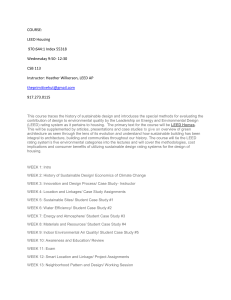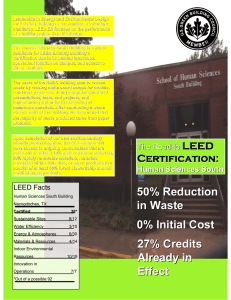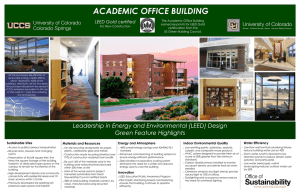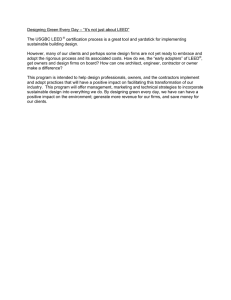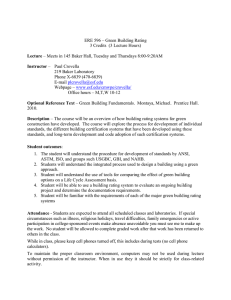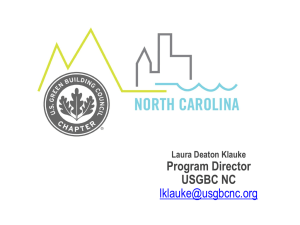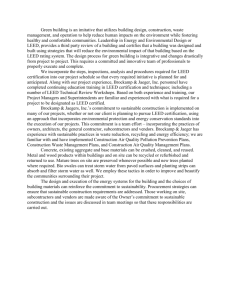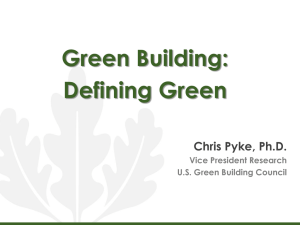3 Credits (3 Lecture Hours) 219 Baker Laboratory Phone X-6839 (470-6839)
advertisement
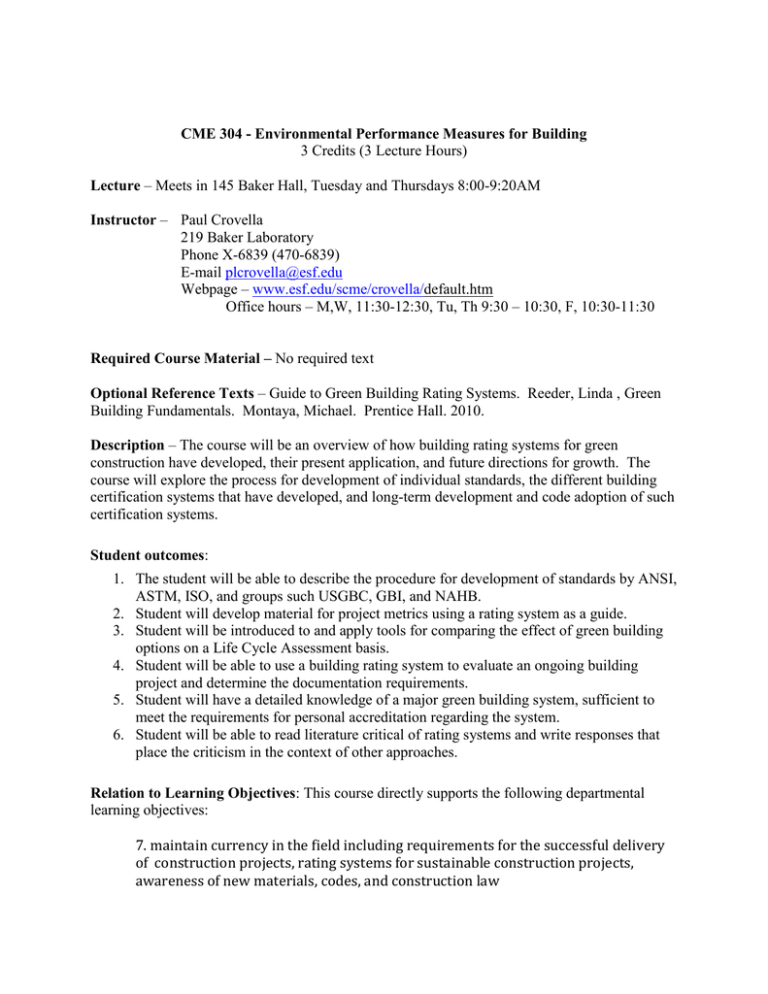
CME 304 - Environmental Performance Measures for Building 3 Credits (3 Lecture Hours) Lecture – Meets in 145 Baker Hall, Tuesday and Thursdays 8:00-9:20AM Instructor – Paul Crovella 219 Baker Laboratory Phone X-6839 (470-6839) E-mail plcrovella@esf.edu Webpage – www.esf.edu/scme/crovella/default.htm Office hours – M,W, 11:30-12:30, Tu, Th 9:30 – 10:30, F, 10:30-11:30 Required Course Material – No required text Optional Reference Texts – Guide to Green Building Rating Systems. Reeder, Linda , Green Building Fundamentals. Montaya, Michael. Prentice Hall. 2010. Description – The course will be an overview of how building rating systems for green construction have developed, their present application, and future directions for growth. The course will explore the process for development of individual standards, the different building certification systems that have developed, and long-term development and code adoption of such certification systems. Student outcomes: 1. The student will be able to describe the procedure for development of standards by ANSI, ASTM, ISO, and groups such USGBC, GBI, and NAHB. 2. Student will develop material for project metrics using a rating system as a guide. 3. Student will be introduced to and apply tools for comparing the effect of green building options on a Life Cycle Assessment basis. 4. Student will be able to use a building rating system to evaluate an ongoing building project and determine the documentation requirements. 5. Student will have a detailed knowledge of a major green building system, sufficient to meet the requirements for personal accreditation regarding the system. 6. Student will be able to read literature critical of rating systems and write responses that place the criticism in the context of other approaches. Relation to Learning Objectives: This course directly supports the following departmental learning objectives: 7. maintain currency in the field including requirements for the successful delivery of construction projects, rating systems for sustainable construction projects, awareness of new materials, codes, and construction law 9. understand and promote “stewardship of both the natural and the designed environments (from ESF Mission Statement)” through best professional practice of sustainable construction management and engineering, and material utilization Attendance - Students are expected to attend all scheduled classes and laboratories. If special circumstances such as illness, travel difficulties, family emergencies or active participation in college-sponsored events make absence unavoidable you must see me to make up the work. For these cases, no student will be allowed to complete graded work after that work has been returned to others in the class. Any student with more than 3 unexcused absences will be subject to automatic failure of the course. In the case of absence due to religious observance, students will be provided an opportunity to make up any examination, study, or work requirements that may be missed provided you notify me by e-mail before the end of the second week of classes. Further information about the SU policy that this is based on can be found at http://supolicies.syr.edu/emp_ben/religious_observance.htm While in class, please keep cell phones turned off, this includes during tests (no cell phone calculators). To maintain the proper classroom environment, computers may not be used during lecture without permission of the instructor. When in use they it should be strictly for class-related activity. Academic Accommodations - Students wishing to utilize academic accommodations due to a diagnosed disability of any kind must present an Academic Accommodations Authorization Letter generated by Syracuse University’s Office of Disability Services. If you currently have an Authorization Letter, please present this to me as soon as possible so that I may assist with the establishment of your accommodations. Students who do not have a current Academic Accommodations Authorization Letter from Syracuse University’s Office of Disability Services cannot receive accommodations. If you do not currently have an Authorization Letter and feel you are eligible for accommodations, please contact Heather Rice in the Office of Counseling and Disabilities Services, 110 Bray Hall, (315) 470-6660 or counseling@esf.edu as soon as possible. Academic Honesty – Honesty and integrity are major elements in professional behavior and are expected of each student. Any assignment (including those in electronic media) submitted by a student must be of the student's original authorship. Representation of another's work as the student’s own shall constitute plagiarism. Cheating, in any form, is an unacceptable behavior within all college courses, and the college policy on academic integrity (as outlined in the handbook “Academic Integrity ESF” at http://www.esf.edu/students/handbook/ ) will be strictly adhered to. Grading – The course grading will be a combination of grades earned on homework, quizzes, tests, group project work, class presentation, and the final exam. The final grade will be based on these percentages Homework 30% Quizzes 30% Rating Projects 20% Class participation 10% Final Exam 10% Homework – All written work must be word-processed and spell checked. Any calculations may be hand-written neatly with the answer labeled with units and boxed. Any homework not turned in on-time needs to be discussed with the instructor to determine if credit will be given. No late homework will be accepted after the assignment has been graded and returned to the rest of the class. Course Outline: Overview of the history of code development, standards development, rating systems groups and types of certifications, accreditations, and labeling and methodology. Week 1 In class I-survey Economic impacts of building environmental certifications. Homework - Doing Well by Doing Good? Green Office Buildings History of USGBC and LEED-series development Intro to LEED for NC v3.0 – Sustainable Sites Week 2 Homework – Green Associate questions, Report on Building Rating and Certification in the US Building Community Week 3 LEED for NC v3.0 – Sustainable Sites Homework – Sustainable Sites questions Week 4 LEED for NC v3.0 – Water Efficiency Homework – Water Efficiency questions Week 5 LEED for NC v3.0 – Energy and Atmosphere Week 6 LEED for NC v3.0 – Energy and Atmosphere Homework – Energy and Atmosphere questions Week 7 LEED for NC v3.0 – Materials and Resources Homework – Materials and Resources Week 8 LEED for NC v3.0 – Indoor Environmental Quality Homework – Indoor Environmental Quality Week 9 Week 10 Week 11 LEED for NC v3.0 – Indoor Environmental Quality, Other LEED series ICC 700,IGCC, ASHRAE 189.1, LCA Homework – NY Times article, LEED critique, LEED analysis: rational and regional application. Life Cycle Assessment – BEES model, Green Globes, Athena LCA calculator Homework – Evaluation of LEED Using Life Cycle Assessment Methods Reduced Energy certifications – Passive house, Zero Energy Buildings, Energy Performance measures (Energy Star, HERS, EUI, CBECS) Week SEMESTER PROJECT DUE – IN CLASS ON TUESDAY 12 Homework – Regional Green Building Case Study Project: Energy Performance Study by NBI, A post‐occupancy study of LEED projects in Illinois, Gifford article, Scofield article, Mass. Building study Week 13 Living Building Challenge, Environments for living Homework - Radical Sustainable Construction Week 14 Multiple Attribute Product Certifications - EPDs, PDRs UL environment, Green Seal, Eco-label, Pharos, Environmentally Preferred Products (Water Sense, FSC, SFI,etc)
